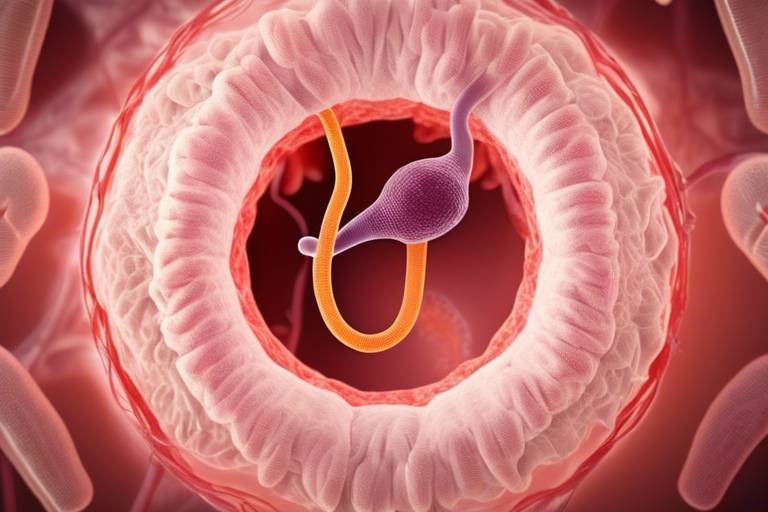Understanding the Importance of Regular Parasite Testing
In today's world, the significance of regular parasite testing cannot be overstated. Many people often overlook the potential dangers that parasites pose to their health, assuming that they are only a concern for those who travel to exotic locations or have pets. However, parasites can be lurking in our environment, ready to wreak havoc on our bodies and well-being. By understanding the importance of regular testing, we can take proactive steps to protect ourselves and our loved ones from serious health complications.
Parasites can enter our bodies in various ways, whether through contaminated food, water, or even through our beloved pets. They can cause a range of health issues, from mild discomfort to severe diseases that can lead to hospitalization. This is why regular testing is crucial. It allows for early detection and treatment, which can significantly improve health outcomes. Imagine having a small leak in your roof; if you catch it early, you can fix it before it causes extensive damage. The same principle applies to parasite infections.
Furthermore, the benefits of regular parasite testing extend beyond just individual health. It contributes to public health awareness. When more people are tested and treated for parasites, it reduces the overall prevalence of these organisms in the community. This collective effort can prevent outbreaks and protect vulnerable populations, such as children and the elderly, who may be more susceptible to infections. By prioritizing regular testing, we are not only safeguarding our health but also contributing to the well-being of our community.
In this article, we will delve deeper into the types of tests available, the common parasites to be aware of, and the preventative measures that can be taken to minimize the risk of infections. So, let’s embark on this journey of understanding and empowerment, ensuring that we are equipped with the knowledge to protect ourselves against these unseen threats!
Regular parasite testing is crucial for early detection and treatment, helping to prevent complications associated with various parasitic infections. Understanding its necessity can enhance overall health management.
Familiarizing yourself with common parasites such as worms, protozoa, and ectoparasites is essential. Each type presents unique risks and symptoms, making awareness vital for effective prevention and treatment.
Intestinal parasites, like roundworms and hookworms, can cause gastrointestinal issues. Recognizing their signs and symptoms is key to timely diagnosis and treatment, ensuring better health outcomes.
Symptoms such as abdominal pain, diarrhea, and weight loss may indicate intestinal infections. Identifying these early can lead to prompt medical intervention and improved health.
Diagnosis often involves stool tests, while treatment may include antiparasitic medications. Understanding these options helps in making informed decisions about health management.
Ectoparasites, including fleas and ticks, can cause discomfort and transmit diseases. Awareness of their impact on both humans and pets is essential for effective control measures.
Different testing methods, including blood tests and stool analysis, vary in effectiveness. Knowing how often to test based on risk factors is vital for maintaining health.
At-home testing kits offer convenience for initial screenings. Understanding their use and limitations can empower individuals to take charge of their health proactively.
Utilizing professional testing services ensures accurate results and comprehensive evaluations. This section discusses the benefits of seeking professional help for parasite testing.
Implementing preventative measures, such as maintaining hygiene and proper food handling, can significantly reduce the risk of parasitic infections. Awareness of these practices is key to safeguarding health.
Good hygiene practices, including regular handwashing and safe food preparation, play a crucial role in preventing parasite transmission. This section emphasizes their importance in daily life.
Proper pet care, including regular veterinary check-ups and parasite control measures, can prevent the spread of parasites to humans. Understanding this link is vital for family health.
- How often should I get tested for parasites? It depends on your lifestyle, travel habits, and exposure to pets. Generally, annual testing is recommended for most individuals.
- Can parasites be transmitted from pets to humans? Yes, many parasites can be transmitted from pets to humans, which is why regular veterinary check-ups and parasite control are essential.
- What are the common symptoms of parasite infections? Symptoms can vary but often include gastrointestinal issues, fatigue, and unexplained weight loss.
- Are at-home testing kits reliable? While they offer convenience, it's important to follow up with professional testing for accurate diagnosis and treatment.

The Necessity of Parasite Testing
When it comes to our health, many of us often overlook the silent invaders that can wreak havoc on our bodies—parasites. Regular parasite testing is not just a precaution; it’s a necessity for anyone who wants to maintain optimal health. Imagine your body as a fortress. If you don’t regularly check for cracks in the walls, you might not realize that an enemy has slipped in until it’s too late. This is precisely why early detection and treatment are crucial.
Parasites can be sneaky. They often reside in our bodies without causing immediate symptoms, which makes them all the more dangerous. By the time you start feeling unwell, the infection may have already progressed, leading to complications that could have been avoided with timely testing. Regular testing helps catch these unwelcome guests before they can establish a foothold in your system, allowing for prompt treatment and a quicker recovery.
But why is it so important to stay vigilant? Here are a few reasons:
- Prevention of Complications: Untreated parasitic infections can lead to severe health issues, including malnutrition, organ damage, and even life-threatening conditions.
- Peace of Mind: Knowing that you are free from parasites can alleviate anxiety related to unexplained symptoms or health concerns.
- Improved Quality of Life: Regular testing and early treatment can lead to better overall health, allowing you to enjoy life without the burden of illness.
In addition to these benefits, understanding the necessity of parasite testing can enhance your overall health management strategy. It encourages individuals to be proactive rather than reactive. Think of it like getting regular check-ups for your car; you wouldn’t wait until the engine fails to have it inspected. Similarly, your body deserves the same level of care and attention.
Moreover, certain populations may be at a higher risk for parasitic infections, such as travelers, those with compromised immune systems, and individuals living in areas with poor sanitation. For these groups, regular testing is even more critical. It’s not just about personal health; it’s about community health. By identifying and treating infections early, we can help prevent the spread of parasites to others.
In conclusion, the necessity of regular parasite testing cannot be overstated. It is a simple yet effective way to safeguard your health and well-being. By staying informed and proactive, you can ensure that your body remains a fortress against these silent invaders.

Common Types of Parasites
When it comes to parasites, knowledge is power. Familiarizing yourself with the different types of parasites can significantly enhance your ability to recognize potential threats to your health. Parasites can be broadly categorized into three main types: worms, protozoa, and ectoparasites. Each type carries its own set of risks and symptoms, making awareness crucial for effective prevention and treatment.
Worms are perhaps the most notorious of the parasites. These include intestinal worms like roundworms, tapeworms, and hookworms. They often thrive in the gastrointestinal tract, where they can cause a range of uncomfortable symptoms. For instance, roundworms can lead to abdominal pain and malnutrition, while tapeworms might go unnoticed for a long time, only to cause severe weight loss or digestive issues. The sneaky nature of these worms makes it imperative to recognize the signs early.
Next, we have protozoa. These microscopic organisms can invade various parts of the body, leading to illnesses such as giardiasis and amoebic dysentery. Protozoan infections often present with symptoms like diarrhea, fatigue, and dehydration. Understanding the potential impact of these tiny invaders can help in seeking timely medical intervention, especially in areas where such infections are more prevalent.
Lastly, ectoparasites are those pesky creatures that live on the outside of the host. Fleas, ticks, and lice are prime examples. They may seem like mere nuisances, but they can transmit serious diseases such as Lyme disease and Rocky Mountain spotted fever. The discomfort they cause can lead to scratching and secondary infections, which further complicate health issues. Awareness of these parasites is essential, particularly for pet owners, as pets can easily become carriers.
Here's a quick overview of these common parasites:
| Type of Parasite | Examples | Common Symptoms |
|---|---|---|
| Worms | Roundworms, Tapeworms, Hookworms | Abdominal pain, Weight loss, Malnutrition |
| Protozoa | Giardia, Entamoeba histolytica | Diarrhea, Fatigue, Dehydration |
| Ectoparasites | Fleas, Ticks, Lice | Itching, Skin irritation, Disease transmission |
By being aware of these common types of parasites, you can take proactive steps to protect yourself and your loved ones. Regular testing and monitoring are essential, especially if you notice any symptoms that could indicate a parasitic infection. Remember, an informed individual is a healthy individual!
Q: How can I tell if I have a parasitic infection?
A: Common signs include unexplained weight loss, gastrointestinal issues, fatigue, and skin irritations. If you experience these symptoms, consult a healthcare professional for testing.
Q: Are all parasites harmful to humans?
A: While many parasites can cause health issues, some may not lead to significant symptoms. However, it’s best to be cautious and have regular check-ups to ensure your health is not compromised.
Q: How can I prevent parasitic infections?
A: Maintaining good hygiene, cooking food thoroughly, and keeping pets treated for parasites are effective preventive measures. Regular testing is also recommended, especially for those at higher risk.
Intestinal Parasites
Intestinal parasites are a sneaky bunch, often lurking in the shadows of our digestive system, waiting for the perfect moment to wreak havoc. These microscopic creatures, including roundworms, hookworms, and tapeworms, can cause a range of gastrointestinal issues that can leave you feeling less than your best. Imagine having a party in your gut, but instead of celebrating, these uninvited guests are causing chaos! It's crucial to recognize the signs and symptoms associated with these parasites to ensure early diagnosis and treatment.
One of the most common types of intestinal parasites is the roundworm. These parasites can grow quite large, sometimes reaching lengths of up to a foot! They can cause serious issues, including malnutrition and abdominal pain, as they steal nutrients from your body. Hookworms, on the other hand, are much smaller but can be equally harmful. They attach themselves to the intestinal walls and can lead to anemia due to blood loss. Understanding the risks associated with these parasites is essential for effective prevention.
So, how do you know if you have an intestinal parasite? Some of the symptoms to watch out for include:
- Abdominal pain: Persistent discomfort or cramping in the stomach area.
- Diarrhea: Frequent loose or watery stools, which can lead to dehydration.
- Weight loss: Unexplained weight loss despite a normal diet.
- Fatigue: A general feeling of tiredness or lack of energy.
Recognizing these symptoms early can lead to prompt medical intervention, ensuring that you get the treatment you need before the situation escalates. Diagnosis typically involves stool tests, which can identify the presence of these parasites in your system. If you're diagnosed with an intestinal parasite, don't panic! Treatment options are available, often including antiparasitic medications that can effectively eliminate these unwelcome guests.
In summary, staying informed about intestinal parasites is crucial for maintaining good health. By recognizing the symptoms, understanding the risks, and seeking timely medical advice, you can safeguard your digestive health and prevent complications associated with these parasites. Remember, your gut deserves to be a no-party zone!
Q: How can I prevent intestinal parasites?
A: Maintaining good hygiene, such as washing your hands regularly, cooking food thoroughly, and avoiding contaminated water, can significantly reduce your risk.
Q: Are intestinal parasites common?
A: Yes, intestinal parasites are more common than you might think, especially in areas with poor sanitation. It's essential to be aware of the risks.
Q: Can pets transmit intestinal parasites to humans?
A: Absolutely! Pets can carry parasites that may be transmitted to humans, so regular veterinary check-ups and parasite control measures are vital.
Symptoms of Intestinal Infections
When it comes to intestinal infections, being aware of the symptoms can be a game-changer. These infections can sneak up on you, often presenting signs that may seem harmless at first but can escalate quickly if left untreated. Imagine your body is hosting uninvited guests—these parasites thrive on your nutrients and can wreak havoc on your digestive system. So, what should you be on the lookout for?
Common symptoms of intestinal infections include:
- Abdominal Pain: This can range from mild discomfort to severe cramping, often indicating that something is amiss in your gut.
- Diarrhea: Frequent, loose stools can be a clear sign of an infection. This symptom can lead to dehydration, which is particularly concerning.
- Weight Loss: Unexplained weight loss can occur as parasites consume the nutrients your body needs, leaving you feeling weak and fatigued.
- Nausea and Vomiting: These symptoms can accompany other digestive issues, making it hard to pinpoint the exact cause.
- Fatigue: A general feeling of tiredness or weakness can signal that your body is fighting off an infection.
Each of these symptoms can vary in intensity and duration, and they might not all appear at once. If you notice any combination of these signs, it’s crucial to consult a healthcare professional. Early diagnosis can lead to effective treatment and a quicker return to your normal routine. Think of it like catching a cold early; the sooner you act, the less likely it is to spiral out of control.
Additionally, other symptoms such as fever or changes in appetite may also accompany these primary signs. Keeping a close eye on your body and recognizing these symptoms can help you take proactive measures. Remember, your gut health is intertwined with your overall well-being, and understanding these warning signs is the first step in safeguarding your health.
Q: How can I differentiate between a common stomach bug and an intestinal parasite infection?
A: While both can cause similar symptoms like diarrhea and abdominal pain, intestinal parasite infections typically persist longer and may lead to weight loss and fatigue due to nutrient depletion.
Q: Is it necessary to see a doctor if I suspect an intestinal infection?
A: Yes, it’s important to seek medical advice if you experience persistent symptoms, especially if they worsen over time. Early intervention can lead to more effective treatment.
Q: Can intestinal infections be prevented?
A: Absolutely! Maintaining good hygiene, cooking food thoroughly, and avoiding contaminated water can significantly reduce your risk of infection.
Diagnosis and Treatment Options
When it comes to diagnosing parasitic infections, the process is often straightforward but requires a keen eye for detail. The most common method of diagnosis involves stool tests, which are designed to detect the presence of parasites or their eggs in your digestive system. A healthcare provider may ask you to provide multiple samples over a few days to ensure accurate results, as some parasites can be elusive and may not be present in every sample. This simple yet effective method can provide crucial insights into your intestinal health.
In addition to stool tests, blood tests can also play a significant role in diagnosing certain parasitic infections. These tests look for antibodies that your body produces in response to a parasite, helping to identify infections that may not be evident through stool samples alone. For example, conditions like malaria or toxoplasmosis are often diagnosed through blood tests, highlighting the importance of comprehensive testing in identifying the full range of parasitic threats.
Once a diagnosis is confirmed, treatment options typically include antiparasitic medications. The specific medication prescribed will depend on the type of parasite identified. For instance, medications such as albendazole or mebendazole are commonly used to treat intestinal worms, while treatments for protozoan infections might include metronidazole or nitazoxanide. It’s essential to follow your healthcare provider’s instructions regarding dosage and duration of treatment, as incomplete treatment can lead to recurrence or resistance.
In some cases, especially when dealing with more severe infections, additional supportive treatments may be necessary. These can include hydration therapy for those experiencing significant diarrhea or nutritional support to address any deficiencies caused by the parasite. The goal is not just to eliminate the parasite but also to restore your overall health and well-being.
Understanding the diagnosis and treatment options available empowers individuals to take charge of their health. Regular check-ups and open communication with healthcare providers can lead to timely interventions, reducing the risk of severe complications associated with parasitic infections.
- How often should I get tested for parasites? It depends on your lifestyle and risk factors, but generally, annual testing is recommended for those at higher risk.
- Are at-home testing kits reliable? While they offer convenience, they may not be as comprehensive as professional testing. It's best to consult a healthcare provider for confirmation.
- Can parasites be transmitted from pets to humans? Yes, many parasites can be transmitted from animals to humans, which is why proper pet care and hygiene practices are essential.
- What should I do if I suspect a parasitic infection? Consult your healthcare provider for appropriate testing and treatment options as soon as possible.
Ectoparasites and Their Impact
Ectoparasites are tiny creatures that thrive on the outside of their hosts, often causing discomfort and a range of health issues. Think of them as unwelcome guests that refuse to leave your home; they can be annoying and even dangerous. Common ectoparasites include fleas, ticks, and lice. These pesky critters not only irritate the skin but can also transmit diseases that pose serious health risks to both humans and pets. For instance, ticks are notorious for carrying Lyme disease, which can lead to severe complications if left untreated.
The impact of ectoparasites extends beyond mere irritation. They can cause allergic reactions, skin infections, and even anemia in severe cases. Fleas, for example, can lead to flea allergy dermatitis in pets, causing intense itching and discomfort. This condition can escalate if not addressed promptly, leading to secondary infections. The presence of these parasites can also create a ripple effect in households, affecting the well-being of all family members, including pets.
To effectively manage ectoparasite infestations, it is crucial to be aware of their life cycles and habitats. Ectoparasites thrive in warm, humid environments, making homes with pets particularly vulnerable. Regular cleaning, vacuuming, and the use of preventive treatments are essential strategies for keeping these pests at bay. Here are some key points to consider:
- Regular grooming of pets can help spot and eliminate ectoparasites before they become a larger problem.
- Environmental control measures, such as washing pet bedding and using flea control products, are vital for prevention.
- Routine veterinary check-ups can ensure that your pets are protected against ectoparasites with appropriate medications.
In conclusion, being proactive about ectoparasite control is not just about comfort; it's about protecting your health and the health of your loved ones. By understanding the impact of these parasites and implementing effective control measures, you can create a safer and more comfortable living environment. Don't wait for an infestation to occur; take action now to safeguard your home and family!
Q: What are ectoparasites?
A: Ectoparasites are organisms that live on the outside of a host, feeding on its blood or skin. Common examples include fleas, ticks, and lice.
Q: How can I tell if my pet has ectoparasites?
A: Symptoms can include excessive scratching, hair loss, and visible pests on the skin or fur. Regular grooming and veterinary check-ups can help detect these issues early.
Q: What are the risks associated with ectoparasites?
A: Ectoparasites can transmit diseases to both pets and humans, cause allergic reactions, and lead to skin infections. Prompt treatment is essential to prevent complications.
Q: How can I prevent ectoparasites in my home?
A: Regular cleaning, vacuuming, grooming pets, and using preventive treatments are effective strategies to keep ectoparasites at bay.

Testing Methods and Frequency
When it comes to parasite testing, understanding the different methods available and how often to utilize them can make all the difference in maintaining your health. With a variety of testing options, each with its own benefits and limitations, it’s essential to choose wisely based on your individual circumstances. The most common methods include blood tests, stool analysis, and urine tests, each tailored to detect specific types of parasites.
Blood tests are often used to identify the presence of certain parasites in the bloodstream. For instance, tests for malaria or toxoplasmosis are typically conducted this way. On the other hand, stool analysis is the gold standard for diagnosing most intestinal parasites, including giardia and various types of worms. This method involves examining a sample of your stool under a microscope to identify any parasitic eggs or larvae.
But how often should you get tested? The frequency of testing largely depends on your lifestyle and risk factors. For example, if you travel frequently to areas where parasitic infections are common, or if you have pets that may carry parasites, it’s advisable to undergo testing at least once a year. However, if you start experiencing symptoms like unexplained weight loss or gastrointestinal discomfort, you should seek testing sooner rather than later.
Here’s a quick overview of recommended testing frequencies based on risk factors:
| Risk Factor | Recommended Testing Frequency |
|---|---|
| Traveling to endemic areas | Every 6 months |
| Owning pets | Annually |
| Experiencing symptoms | As needed |
| General health check-up | Every year |
In addition to these methods, at-home testing kits are becoming increasingly popular. They offer convenience for initial screenings but come with limitations. While they can provide quick results, it’s important to follow up with a healthcare professional for comprehensive testing and accurate diagnosis. Professional testing services not only ensure accurate results but also provide a thorough evaluation of your health status, which can be crucial for effective treatment.
In summary, regular parasite testing is a proactive approach to safeguarding your health. By understanding the various testing methods and knowing when to get tested, you can stay one step ahead of potential health issues. Remember, your health is your wealth, and taking these steps can help you maintain it!
At-Home Testing Kits
At-home testing kits have revolutionized the way we approach health management, particularly when it comes to detecting parasites. These kits are designed to provide convenience and accessibility, allowing individuals to conduct preliminary screenings without the need for a doctor's visit. Imagine being able to check for potential health threats from the comfort of your home—it's like having a mini-laboratory right at your fingertips!
These kits typically include everything you need to collect samples and follow the instructions for testing. Most often, they involve simple processes such as taking a stool sample, which is then analyzed for the presence of parasites. However, while at-home testing kits offer a fantastic starting point, it's important to understand their limitations. They may not always be as accurate as professional tests, and false negatives can occur. Therefore, if you suspect an infection or if your results come back positive, seeking professional medical advice is crucial.
Here are a few key benefits and considerations regarding at-home testing kits:
- Convenience: You can test at your own pace and schedule.
- Privacy: Conduct tests in the comfort of your home without the anxiety of a clinical setting.
- Cost-effective: Generally, these kits are less expensive than visiting a healthcare provider for testing.
However, while these kits can be a valuable tool, they are not a substitute for comprehensive medical evaluation. For instance, if you receive a positive result from an at-home kit, it is imperative to follow up with a healthcare professional for confirmatory testing and appropriate treatment. Think of it as a first step in a journey towards better health—one that ideally involves collaboration with medical experts.
In summary, at-home testing kits can empower individuals to take charge of their health. They serve as a useful preliminary measure to detect potential parasite infections, but they should be viewed as just one part of a broader health management strategy. Always remember, your health is your wealth, and staying informed is key to maintaining it!
Q: How accurate are at-home testing kits for parasites?
A: While at-home testing kits can provide a good indication of potential infections, they may not be as accurate as tests conducted in a clinical setting. Always consult a healthcare professional for confirmation.
Q: What should I do if my at-home test comes back positive?
A: If your test indicates a positive result, it's crucial to seek medical advice immediately for further testing and appropriate treatment options.
Q: How often should I use at-home testing kits?
A: The frequency of testing can depend on your individual risk factors, such as travel history, exposure to pets, or symptoms. It's advisable to discuss this with a healthcare provider.
Q: Are there any specific brands of at-home testing kits you recommend?
A: While there are several reputable brands available, it’s essential to choose kits that are FDA-approved or have been validated by health professionals. Always read reviews and do your research before purchasing.
Professional Testing Services
When it comes to ensuring your health and well-being, nothing beats the reliability of . These services are designed to provide you with accurate results and a thorough evaluation of your health status, especially when it comes to detecting parasites. Unlike at-home kits, which can sometimes be hit or miss, professional testing is conducted by trained experts who understand the nuances of parasitic infections. They use advanced techniques and equipment that can detect even the most elusive parasites.
One of the major benefits of opting for professional testing is the comprehensive nature of the evaluations. These services often include a detailed consultation where healthcare professionals can discuss your symptoms, medical history, and potential exposure risks. This personalized approach ensures that the testing is tailored to your specific needs, making it more effective. For instance, if you have pets, travel often, or consume raw foods, these factors will be taken into account during the assessment.
Moreover, the process typically involves a variety of tests that can provide a clearer picture of your health. Common testing methods include:
- Stool Analysis: This is one of the most common methods to detect intestinal parasites. It involves examining a stool sample for signs of parasites or their eggs.
- Blood Tests: Certain parasites can be identified through blood tests, which check for antibodies or other markers indicating an infection.
- Imaging Studies: In some cases, imaging techniques like ultrasounds or CT scans may be used to identify complications caused by parasites.
After the tests are completed, the results are analyzed and discussed with you in detail. This is where the true value of professional services shines. You’ll receive not just a report but also an explanation of what the results mean for your health. If any parasites are detected, healthcare providers can recommend appropriate treatment options tailored to your situation. This might include prescription medications or lifestyle changes that can help eliminate the parasites and restore your health.
In summary, while at-home testing kits can offer convenience, they often lack the depth and accuracy of professional services. If you're serious about your health and suspect you might have a parasitic infection, seeking professional help is the way to go. It’s like having a personal health detective on your side, ensuring that you get the best possible care and treatment.
Q: How often should I get tested for parasites?
A: It depends on your lifestyle and risk factors. If you travel frequently, have pets, or experience gastrointestinal symptoms, it’s wise to consider testing annually or even more frequently.
Q: Are professional testing services expensive?
A: Costs can vary depending on the type of tests conducted and your location. However, many find that the peace of mind and accurate results are worth the investment.
Q: Can I get tested for parasites without showing symptoms?
A: Yes, many people choose to get tested even if they aren’t experiencing symptoms, especially if they have risk factors such as travel or exposure to pets.
Q: What should I do if my test results are positive?
A: Consult your healthcare provider for a treatment plan. They will guide you through the necessary steps to eliminate the parasites and improve your health.

Preventative Measures
When it comes to safeguarding your health against parasitic infections, are your first line of defense. Just like locking your doors at night keeps your home safe, implementing simple yet effective practices can significantly reduce your risk of encountering these unwanted invaders. It's not just about being cautious; it's about being proactive. So, what can you do to protect yourself and your loved ones?
One of the most effective ways to prevent parasitic infections is through proper hygiene practices. Regular handwashing, especially after using the restroom or before handling food, is crucial. Think of your hands as the main highway for germs; if you keep them clean, you’re less likely to let those pesky parasites hitch a ride. In addition to handwashing, make sure to wash fruits and vegetables thoroughly before consumption. Just like you wouldn’t eat off a dirty plate, you shouldn’t consume unwashed produce either!
Another vital aspect of prevention is safe food handling. Cooking meat to the appropriate temperatures can kill harmful parasites. For instance, did you know that cooking pork to an internal temperature of at least 145°F (63°C) can eliminate the risk of trichinellosis? Keeping your kitchen clean and ensuring that raw and cooked foods are separated is essential. Cross-contamination can be a sneaky way for parasites to enter your meals.
Additionally, if you have pets, it’s important to prioritize their health as well. Regular veterinary check-ups and parasite control measures, such as flea and tick treatments, can prevent your furry friends from becoming carriers of parasites that could affect your family. Remember, a healthy pet contributes to a healthy home. Just like a chain is only as strong as its weakest link, your household's health depends on every member, including your pets.
Here’s a quick summary of some key preventative measures:
- Practice good hygiene: Wash hands regularly and thoroughly.
- Handle food safely: Cook meat to safe temperatures and wash produce well.
- Care for pets: Schedule regular vet visits and keep them on parasite control medications.
By incorporating these habits into your daily routine, you can create a fortress around your health. Just as a gardener tends to their plants to prevent pests, you too can cultivate a lifestyle that minimizes the risk of parasitic infections. Remember, prevention is always better than cure!
Q: How often should I get tested for parasites?
A: It depends on your risk factors. If you travel frequently or have pets, consider testing annually or as recommended by your healthcare provider.
Q: Can I rely solely on at-home testing kits?
A: While at-home kits can be convenient, they may not be as comprehensive as professional testing. It's best to consult a healthcare provider for accurate diagnosis and treatment.
Q: What should I do if I suspect a parasitic infection?
A: Consult your healthcare provider immediately. Early diagnosis and treatment are crucial for effective recovery.
Hygiene Practices
When it comes to preventing parasitic infections, are your first line of defense. Think of hygiene as a shield—one that you can wield to protect yourself and your loved ones from the unseen threats that parasites pose. Regular and effective hygiene habits are not just good practice; they are essential in keeping those pesky invaders at bay. So, what can you do to ensure you're doing your part in maintaining a parasite-free environment?
First and foremost, washing your hands frequently is paramount. This simple act can significantly reduce the transmission of parasites, especially after using the restroom or before handling food. It’s almost like a magic trick; with soap and water, you can wash away potential threats! Always remember to scrub for at least 20 seconds, making sure to get in between your fingers and under your nails. If soap and water aren't available, hand sanitizers with at least 60% alcohol can be a good alternative.
Next, safe food preparation practices are crucial. This means washing fruits and vegetables thoroughly before consumption and ensuring that meat is cooked to the appropriate temperatures. Did you know that certain parasites can survive in undercooked meat? By using a food thermometer, you can make sure your meals are not only delicious but also safe. Here’s a quick reference table to help you remember the safe cooking temperatures:
| Food Type | Safe Minimum Internal Temperature |
|---|---|
| Poultry (chicken, turkey) | 165°F (75°C) |
| Ground meats (beef, pork, lamb) | 160°F (71°C) |
| Fish and shellfish | 145°F (63°C) |
| Whole cuts of meat (beef, pork, lamb) | 145°F (63°C) with a 3-minute rest time |
Another crucial aspect of hygiene is being mindful of your pets. Regularly bathing your pets and keeping their living areas clean can prevent the spread of parasites from animals to humans. After all, our furry friends can sometimes be carriers of parasites without showing any signs. It’s a bit like having a secret agent in your home—cute but potentially dangerous!
Finally, don't overlook the importance of cleaning your living environment. Regularly vacuuming carpets, washing bed linens, and disinfecting surfaces can help eliminate any lingering eggs or larvae that might be lurking around. Think of your home as a fortress; the cleaner it is, the less likely it is to be invaded by unwanted guests.
In summary, practicing good hygiene is a proactive way to reduce the risk of parasitic infections. By incorporating these habits into your daily routine, you're not just protecting yourself but also contributing to the health of your family and community. Remember, a little effort goes a long way, and the peace of mind that comes from knowing you’re doing your best to stay safe is invaluable.
- How often should I wash my hands? It's best to wash your hands frequently, especially before meals and after using the restroom.
- What are the symptoms of a parasitic infection? Common symptoms include abdominal pain, diarrhea, and unexplained weight loss.
- Can pets transmit parasites to humans? Yes, pets can carry parasites that can be transmitted to humans, so regular veterinary check-ups are essential.
- What should I do if I suspect a parasitic infection? Consult a healthcare professional for proper diagnosis and treatment.
Pet Care and Parasite Control
When it comes to keeping our furry friends safe and healthy, pet care and parasite control are paramount. Pets, like dogs and cats, are not just companions; they’re family members. But did you know that they can also be carriers of parasites that pose a risk to both their health and ours? This is why understanding the connection between proper pet care and effective parasite control is essential for safeguarding your entire household.
First off, regular veterinary check-ups are crucial. Just as we visit the doctor for our health, our pets need routine examinations to catch potential parasite infestations early. During these visits, veterinarians can perform necessary tests to detect any lurking parasites. For instance, a simple fecal test can reveal the presence of intestinal worms, which, if left untreated, can lead to serious health issues for your pet. Here’s a quick look at common parasites that affect pets:
| Type of Parasite | Common Symptoms | Potential Risks |
|---|---|---|
| Fleas | Itching, hair loss, skin infections | Allergic reactions, tapeworms |
| Ticks | Skin irritation, lethargy | Lyme disease, Rocky Mountain spotted fever |
| Worms | Weight loss, vomiting, diarrhea | Severe gastrointestinal issues, anemia |
In addition to regular vet visits, implementing a consistent parasite prevention program is vital. This can include administering monthly flea and tick medications, as well as deworming treatments. Many pet owners may wonder, “How do I know which products to use?” It’s best to consult your veterinarian, who can recommend the most effective products based on your pet's lifestyle and the local parasite prevalence.
Moreover, keeping your pet’s environment clean plays a significant role in parasite control. Regularly cleaning your pet’s bedding, vacuuming your home, and maintaining a tidy yard can help minimize the risk of infestations. Remember, parasites thrive in dirty environments, so a little bit of cleanliness goes a long way!
Finally, educating yourself about the signs of parasite infestations can empower you to act quickly. If you notice your pet scratching excessively, losing weight, or exhibiting unusual behavior, don’t hesitate to reach out to your vet. Early intervention can make all the difference in your pet’s health and can prevent the spread of parasites to humans.
In summary, effective pet care and parasite control is a shared responsibility that benefits both your pets and your family. By staying vigilant, maintaining hygiene, and seeking professional advice, you can keep your furry companions happy and healthy while also protecting yourself and your loved ones from potential health risks.
- How often should I take my pet to the vet for parasite checks? It is recommended to visit the veterinarian at least once a year for a comprehensive health check, including parasite testing.
- What are the signs that my pet may have a parasite? Look for symptoms such as itching, weight loss, vomiting, diarrhea, or lethargy. If you notice any of these, consult your veterinarian.
- Can parasites affect humans? Yes, many parasites can be transmitted from pets to humans, which is why regular parasite control is essential for both pets and people.
- Are there natural remedies for parasite control? While some natural remedies exist, it's best to consult your veterinarian before using them to ensure they are safe and effective.
Frequently Asked Questions
- Why is regular parasite testing important?
Regular parasite testing is crucial because it helps in the early detection of parasitic infections. By identifying these infections early, you can prevent serious health complications and ensure timely treatment, leading to better health outcomes.
- What types of parasites should I be aware of?
Common parasites include intestinal parasites like roundworms and hookworms, as well as ectoparasites such as fleas and ticks. Each type presents unique risks and symptoms, so knowing about them can help you take preventive measures.
- What are the symptoms of intestinal infections?
Symptoms of intestinal infections can include abdominal pain, diarrhea, and weight loss. If you experience these symptoms, it’s essential to consult a healthcare professional for proper diagnosis and treatment.
- How are parasitic infections diagnosed?
Diagnosis typically involves stool tests or blood tests. These tests help determine the presence of parasites in your body, allowing for accurate treatment options to be prescribed.
- What treatment options are available for parasitic infections?
Treatment often includes antiparasitic medications, which are designed to eliminate the parasites from your system. Your healthcare provider will recommend the best course of action based on the specific type of infection.
- How often should I get tested for parasites?
The frequency of testing depends on various risk factors, such as travel history, exposure to pets, or specific symptoms. It’s best to consult with your healthcare provider to determine the appropriate testing schedule for you.
- Are at-home testing kits reliable?
At-home testing kits can provide convenience for initial screenings, but they may have limitations in terms of accuracy. It’s advisable to follow up with professional testing for comprehensive evaluation and reliable results.
- What are some preventative measures I can take?
Maintaining good hygiene practices, such as regular handwashing and safe food preparation, can significantly reduce the risk of parasitic infections. Additionally, proper pet care and regular veterinary check-ups are essential for controlling parasites.
- How can I protect my pets from parasites?
To protect your pets, ensure they receive regular veterinary care, vaccinations, and appropriate parasite control measures. This not only safeguards your pets but also reduces the risk of transmission to humans.



















